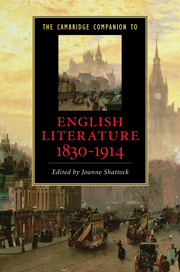13 - Empire and nationalism
from Part III - The centre and the periphery
Published online by Cambridge University Press: 28 November 2010
Summary
Romantic and Victorian writers made both nation and empire central to 'English literature', a phrase that can mean either writing by anyone using the English language or writing exclusively by English authors. The second meaning implies that literatures are nation-based: English literature is the expression or the possession of England. But what about writers from Scotland or Ireland? 'British literature' is equally problematic; thus, even before the Irish Republic gained independence in 1922, 'Irish literature' had its own national and often nationalist resonance. From the Act of Union of 1707, which joined England and Scotland in a single polity, 'Great Britain' or the 'United Kingdom' developed simultaneously as a modern nation-state and as an expanding empire. Because Britain consisted of England plus the 'internal colonies' of Wales, Scotland and Ireland, and also of an overseas empire including both India and territories of 'white settlement' in Canada, Australia, New Zealand and South Africa, the interplay of nation and empire in literature is extraordinarily complex. Like Irish literature, formerly colonial literatures, often written in English, are now postcolonial - obviously no longer British.
Throughout the nineteenth century, literary works not overtly focused on themes of nation and empire nevertheless played a role in the imaginative forging of English and British identities. Domestic novels - Jane Austen’s Pride and Prejudice (1813), for example, or Charles Dickens’s David Copperfield (1850) - can be read as microcosmic versions of Whig history, the success stories of their protagonists implicitly mirroring the success stories of nation and empire. As French novelist Honoré de Balzac declared, ‘The novel is the private history of nations.’ Further, many writers explicitly celebrated or criticized Britain and its Empire, often doing both simultaneously.
- Type
- Chapter
- Information
- The Cambridge Companion to English Literature, 1830–1914 , pp. 251 - 269Publisher: Cambridge University PressPrint publication year: 2010
- 1
- Cited by

